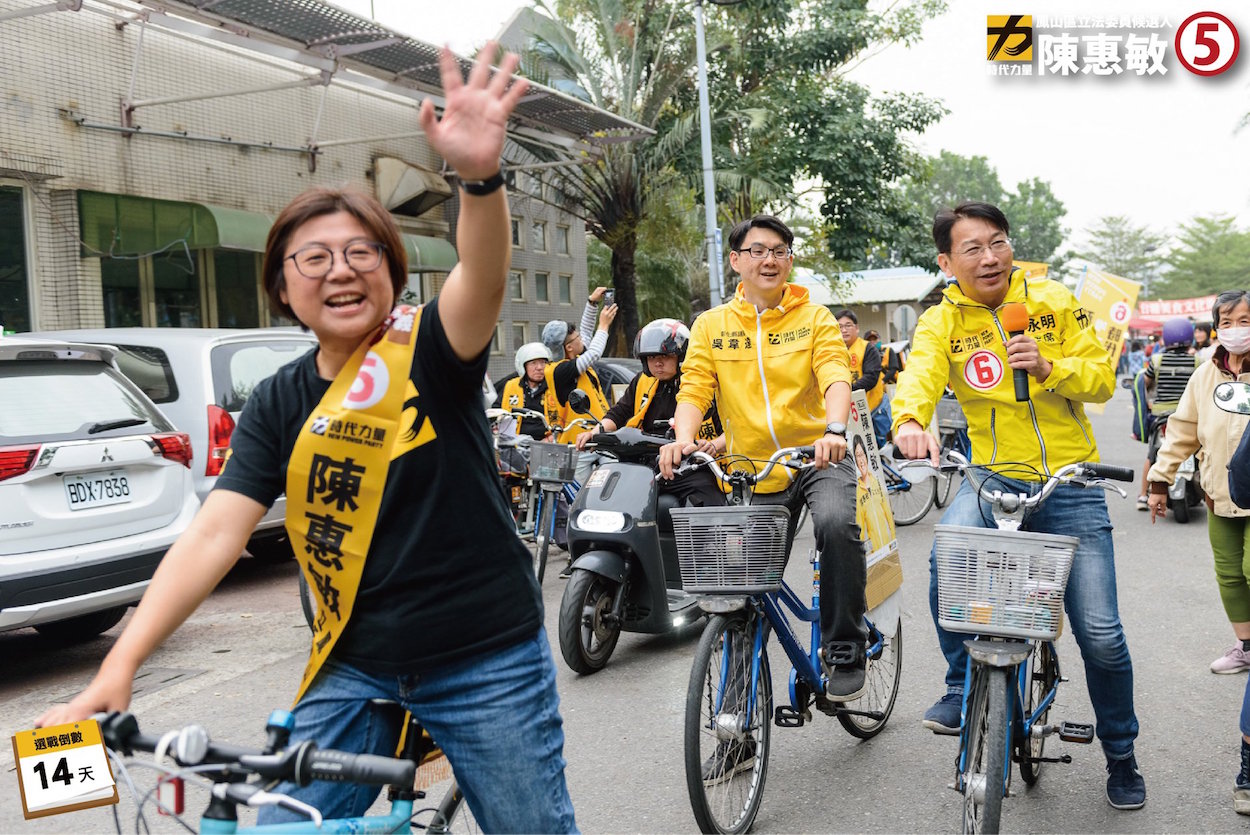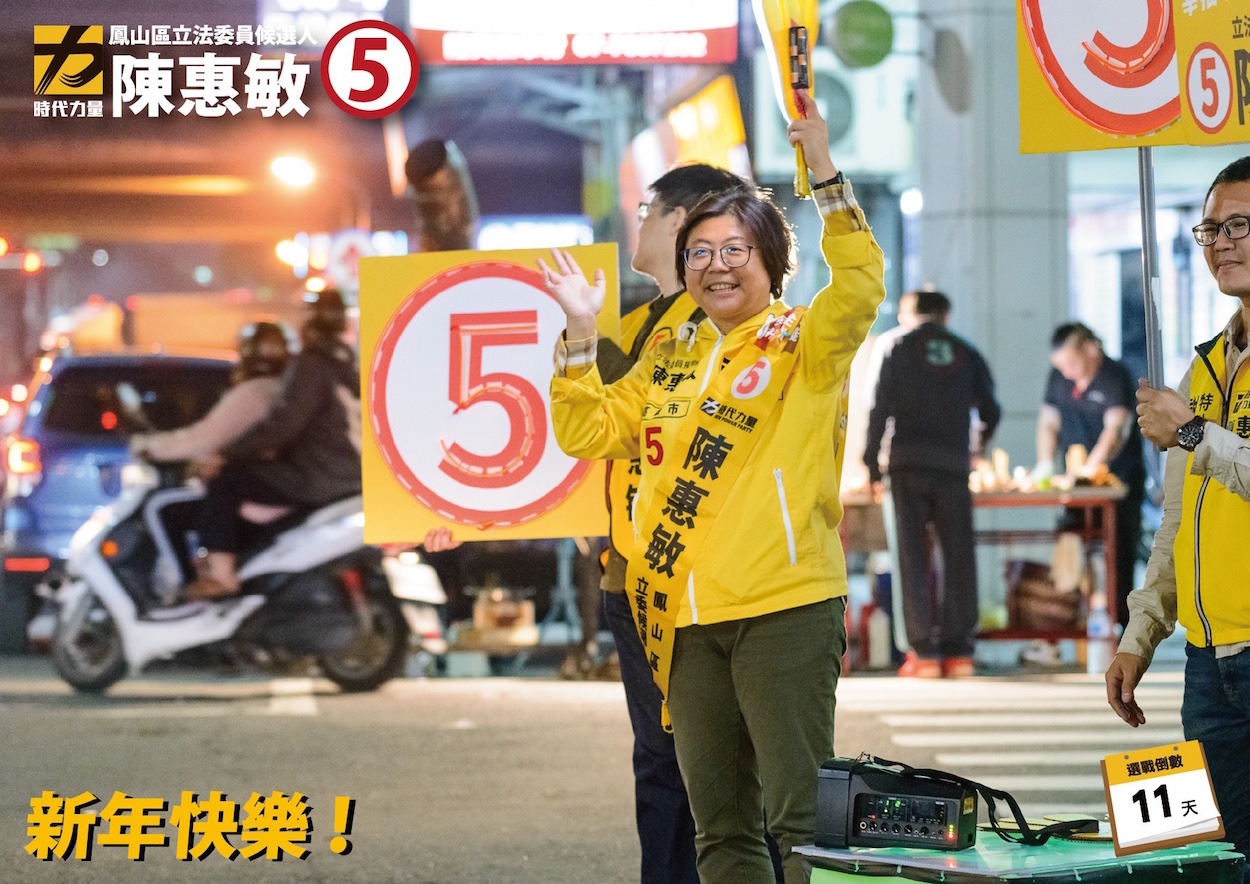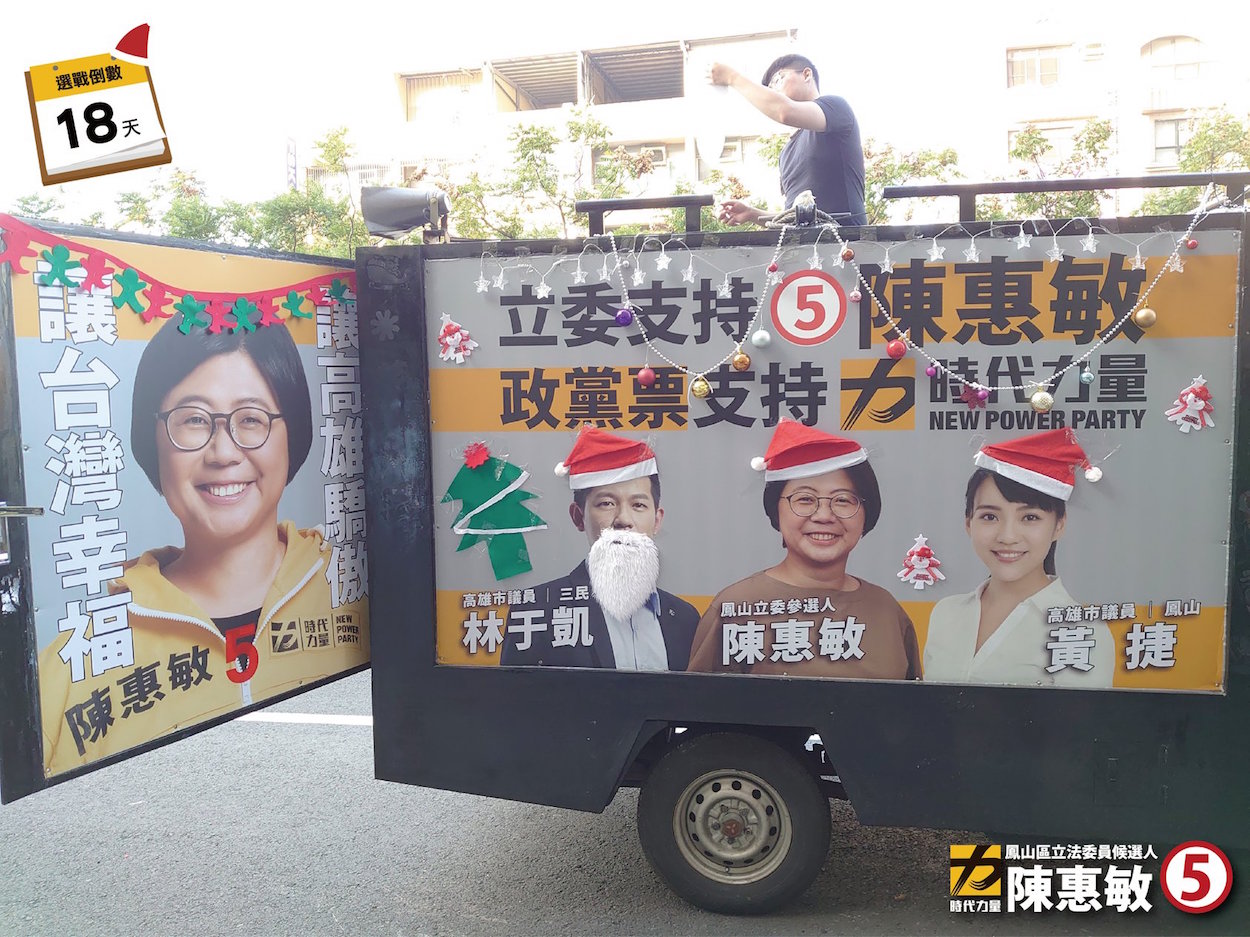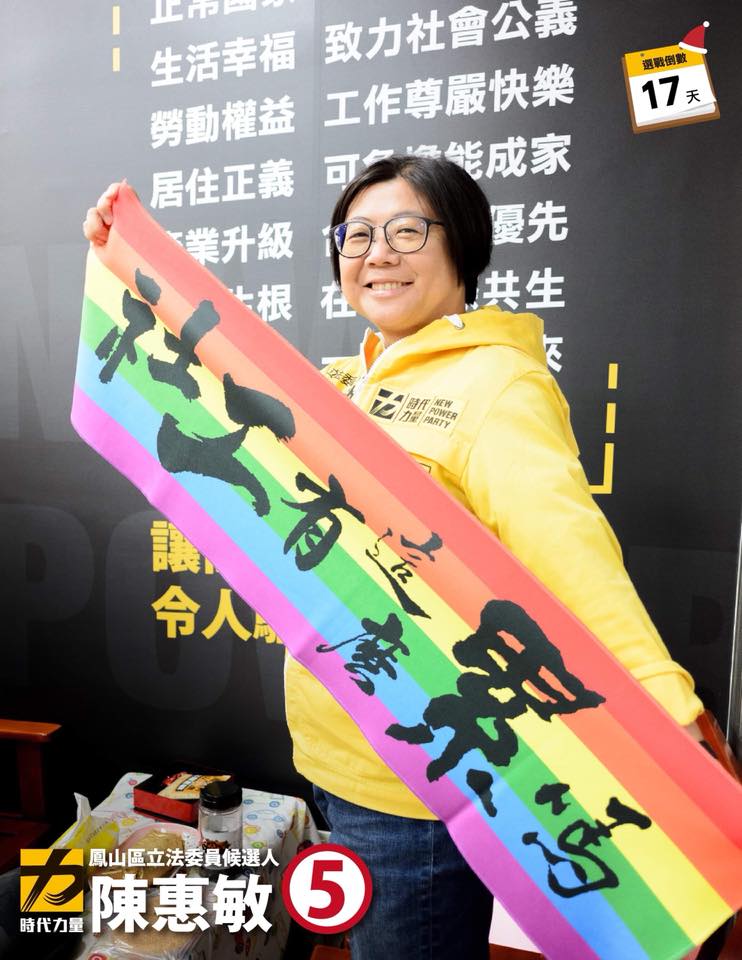by Brian Hioe
語言:
English /// 中文
Photo credit: 陳惠敏 ⑤高雄鳳山立委候選人/Facebook
New Bloom interviewed Chen Hui-min, legislative candidate for the NPP in Fengshan, Kaohsiung, on December 11th. Originally a professor of sociology, Chen was previously active in the Civil Alliance to Promote Constitutional Reform, Taiwan March, and became the first secretary-general of the NPP.
Brian Hioe: Could you first introduce yourself for readers that don’t know you?
Chen Hui-min: Hi everybody, I’m Chen Hui-min from the New Power Party. The NPP was formed in January 2015. I joined around August as the NPP’s secretary-general and I’ve been part of the party since then.
We entered the legislature in February 2016 with five legislative seats. I worked with the legislative caucus up until July of this year, when I decided to run in elections myself. I’m from Kaohsiung myself, so I hope to be able to realize our ideals there.
 Photo credit: 陳惠敏 ⑤高雄鳳山立委候選人/Facebook
Photo credit: 陳惠敏 ⑤高雄鳳山立委候選人/Facebook
BH: Why did you decide to run in elections this year? Because you held a post as the NPP’s secretary-general before.
CHM: My reasons for wanting to participate in this year’s election are the same as with many people, but also not exactly the same. We’ve seen many young people enter new political parties or enter political parties that they previously would not have, like my good friend Lin Fei-fan, who has entered the DPP to take up a post as secretary-general.
This is a result of last year’s elections, which caused a lot of concern. I’m a Kaohsiung person myself, the mayor we elected then is the KMT’s presidential candidate this time, Han Kuo-yu.
This is something that made me worried as well, though it wasn’t such that I would decide to give up all other principles because of concerns about national sovereignty. I was worried that because of this situation, the two major political parties would use their ideologies regarding independence and unification to mobilize supporters, and other issues wouldn’t be discussed.
Just with the development of the situation in Hong Kong from June onward, we can see that democracy isn’t just something that is voting or talking about something. If we really want to protect our national sovereignty, if we hope for our progressive values to continue—this is what led me to decide to run.
This is particularly true for southern Taiwan, which has long been controlled by the DPP. It was Lin Fei-fan who said this, not me—but even a watermelon could get elected if endorsed by the DPP! The social structure is very tight that way.
In 2018, I was responsible for the NPP’s city council elections across all of Taiwan. But I felt that running then, the political shifts in local politics are too small. And people felt there wasn’t anyone we could run. Likewise, I felt that local politics were too dominated by local factions and that this is an obstacle for Taiwanese democracy.
Because of this, it’s difficult to run this kind of campaign and it’s hard to find people that are willing to run. We asked many people, but there weren’t any opportunities to find someone suitable to run. In the end, I decided, why not, I would run myself. [Laughs]
Kaohsiung is where the Formosa Incident, on International Human Rights Day on December 10th, 1979. We can’t let Kaohsiung only be known as a democratic place in name only due to the history of this incident, we need to also have actual social progress.
The other reason I decided to run is that the NPP is frequently thought of as a party that only exists in northern Taiwan or on the Internet only. But what’s truly interesting about political work is having firsthand contact with people. I really believe that this is an important part of political work.
Like our friends in Hong Kong this year, they threw themselves into District Council elections, which was something they prepared for two or three years for. I remember that Joshua Wong was lobbying in Washington DC and then flew back to Hong Kong the next day to do work like count the number of buses, whether they came on time. That’s something I admire and I feel that this kind of local work is very important.
If you want to change politics, does that mean you have to go to Taipei all the time to make yourself heard? Taiwan’s actual issues are in various places. I also hope that this can be an opportunity to show how the NPP hopes to organize itself differently locally.
BH: What do you think is particularly important about this year’s election?
It’s an important one. Of course, there’s a sense now as though the election has ended prematurely, because the KMT candidate seems to no longer exist. The KMT party list played an important role. Originally, the KMT had higher support, perhaps because of anger against the DPP for its actions during its four years of governance, because there were things that people were dissatisfied with.
But after the KMT party list came out, this changed completely. So we have a sense that things are already over. At the same time, I hope it doesn’t just become people playing the China card to attack pro-China groups.
 Photo credit: 陳惠敏 ⑤高雄鳳山立委候選人/Facebook
Photo credit: 陳惠敏 ⑤高雄鳳山立委候選人/Facebook
Both parties play the China card. One in the name of protecting Taiwanese sovereignty and the other to claim that China hopes for peace and feels a sense of responsibility toward us. The KMT is having some issues with this because China’s exploitation of resources around the world is self-apparent, although the KMT tries to claim that fear of China is just a delusion of Taiwanese independence supporters.
Another factor is Hong Kong. With Hong Kong, we can see how the Chief Executive is just a puppet of the Chinese government now.
I’m actually among the older members of the NPP, we’re around forty years old generally. We want to open up Taiwanese politics somewhat, to allow young people to have some opportunities. I also believe strongly in the importance of change.
If this election just becomes two parties competing against each other, depending on their party bases, I think this indicates that Taiwanese democracy has become stuck. It would be quite disappointing if we just end up playing this same game again four years later, and if we’re always talking about these values regarding social progress but this is just talk.
We want to ask how we can deepen democracy. For example, we want to lower the voting age to eighteen, but we haven’t been able to do this.
The issue of gay marriage also dragged on for two years. Some friends are no longer with us or may have ended up a very dark place, something which can be blamed on the ruling party. It let the two sides fight it out, and when a compromised version of the bill came out, everyone had no choice but to endorse this bill in the name of pragmatic needs.
BH: What do you think that the importance of this election is to young people? The DPP is running many young candidates this time, for example.
CHM: I have some different views on this. The DPP is running many young people this time, but I think that this is more on the party list. There are two groups of people that the DPP is running, some are candidates with strong ties to local factions, and they’re viewed as more electable. The other is for the sake of appearances, for the sake of the image of the party as a whole.
But the result of this is that young people are only valued for their age. It’s quite vacuous.
So though it may sound impolite, I’d have to say to young people in the DPP that within an old system of politics, this is how age is treated. They may want to push for some changes, but the results of what they can accomplish in this structure is limited.
We might also worry that young people won’t vote in this year’s election. Young people are traditionally thought of as cold to politics. But on the other hand, with young people all suddenly entering politics all at once, it’s very easy for them to get led around.
You have all these Facebook groups and pages, for example. They provide information and an interpretation of that information and people just go with what they say. I find it quite worrying since deep reflection is needed for a democracy. You have a lot of memes being circulated. They may be quite creative, but decontextualized.
Whether pan-Green or pan-Blue, I believe this is harmful to Taiwanese democracy. Sometimes simple images are used to express hateful views and the two sides attack each other this way. I don’t think this is good.
I believe that young people are quite talented. We’re always calling on young people to go back home and vote, but I also believe that they could have more views and opinions of their own. For example, pushing politicians to state their political views.
Or holding them to account, for things like that many politicians stated that they would push for revisions to lower the voting age, but they haven’t done this. Taiwan is among a very small minority of countries with a voting age of twenty. Even as conservative a country as Japan decided to reduce the voting age by 2020.
 Photo credit: 陳惠敏 ⑤高雄鳳山立委候選人/Facebook
Photo credit: 陳惠敏 ⑤高雄鳳山立委候選人/Facebook
BH: What do you think are the key issues in your electoral district? What are the challenges of running there?
CHM: My electoral district is very interesting. There many military dependents’ villages there, since there are three army schools and so it’s a place with many traditional soldiers.
I’m in the Fengshan District in Kaohsiung, which is place with the largest population in Kaohsiung. Unlike other parts of Kaohsiung, in which the population is declining, it’s a place with an increasing population. So there are both older buildings and land, but also newer ones, and the price of real estate is a bit lower.
As a result, there are young people moving in to work or to start families, and there are many people there dependent on subsidies.
Four years ago, our current legislator in the area won by a large margin, of 70,000 or 80,000 votes. But last year, this is a place where Han Kuo-yu did strongly, winning by 50,000 votes. This is a fluctuation of 130,000 voters, one can’t say that this is just between the party bases of the pan-Green and pan-Blue camps. It’s an area less controlled by local factions.
It’s a place with a lot of culture, such as the culture of the military dependents’ villages, in which Chinese immigrants that came to Taiwan brought their local cultures with them. There are also New Immigrants and young people. There are also old buildings and old villages, as well as new industries that are developing.
I like the area a lot. Because I can dialogue with many different people and get to know what many different people are thinking. I believe dialogue is very important for democracy, so I feel like Fengshan is an area I like very much and it’s a very suitable place for the NPP.
BH: Do you think that political participation by young, progressive people in Taiwan can be situated alongside international trends in politics, regarding young politicians running on progressive platforms in the US, Europe, and beyond?
CHM: Yes, definitely. I don’t see the Sunflower Movement as just a student movement, of course. Because it was thanks to all the citizens outside that the movement was able to hold out for 20 days. The inside of the Legislative Yuan was just a gathering place for a minority.
What was truly amazing was the people on Qingdao East Road, Zhongshan South Road, and Jinan Road. Some were mostly people who had just graduated, around 25, who had just started working. They might have been quite disappointed in society, and many had even voted for Ma Ying-jeou in the past. [Laughs] It was like that.
But they discovered that outside of just minding their own matters, they could also concern themselves with social issues, and became willing to do so. This shows that this nation has hope.
So we would feel that there’s a need to create space for these young people so that they don’t have to wait for their turn in traditional parties, for the people before them to get tired of what they do before they have opportunities. It ends up being a long period of time before young people that enter the DPP will be able to run themselves. By then, they’re no longer young.
The NPP hopes that political work can become normal work. So you can vote for a programmer, for a sound engineer, or for a professional politician. I think that this is what the NPP is working on. We hope for politics to return to people’s everyday lives, to become a normal, but also legitimate, and survivable form of work.
This can allow for changes in the political system. Although there are elections are a necessary part of the game, we want to change the relation that Taiwanese people have with politics.
Sometimes I feel that Taiwanese people can be two-faced. You can see this with Hong Kong. People are scared now because of Hong Kong. But we’ve been working on Hong Kong issues a long time and Taiwanese people usually don’t care. They still have many stereotypes about Hongkongers, that they’re obsessed with money, selfish, and don’t care about other people. It’s hard changing this.
Everyone’s now after seeing the state violence. But when we want to pass for asylum laws for Hongkongers, to allow them to have assurances of safety, Taiwanese people will say, “Don’t do that, what if spies come here?” So I think there’s much to work on.
I don’t think Taiwan is well-disposed toward foreigners. It’s very easy to enter this kind of state when you’re focused only on nationalism. But as a small island country, Taiwan needs outsiders to come in. You can’t exclude others, though you may still need a national identity.
So although there have been some changes, when push comes to shove, people will still say, “That’s not suited for Taiwan” or “Young people are no good.” [Laughs] We’ll keep at it step-by-step, hoping that things can change in the next few decades.
BH: Lastly, what would you have to say to not only Taiwanese readers, but also international ones?
CHM: Taiwan is a mature democracy. But there are some questions to consider internally, as well. We face the question of Democracy 2.0. It can’t just be that we’re the masters of the country one day a year through voting, we have to consider how to introduce more progressive values and social democracy.
 Photo credit: 陳惠敏 ⑤高雄鳳山立委候選人/Facebook
Photo credit: 陳惠敏 ⑤高雄鳳山立委候選人/Facebook
If we can open up politics, this should also include how to have more cooperative forms of economic development or so that resources do not only end up in the hands of a minority. Taiwan can become a happier country that way.
Because I actually don’t think that Taiwanese citizens are happy. They’re always feeling pressured all the time. And they’re really not very confident. People will say, “Well, we’re just Taiwanese.” But I hope that when we refer to ourselves as Taiwanese, apart from this representing that we’re a democracy, this can also come to stand for that we’re from a fortunate society, that this is a place with equal opportunities for the next generation.
BH: Thank you!

